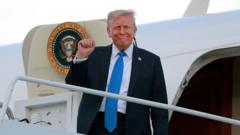As Friedrich Merz falls short of needed votes to become Germany's chancellor, the coalition faces a challenging road ahead, with domestic and international implications looming.
Unprecedented Setback for Friedrich Merz in Chancellor Bid

Unprecedented Setback for Friedrich Merz in Chancellor Bid
Friedrich Merz, Germany's leader-in-waiting, fails to secure votes in first parliamentary round, marking a historic political stumble.
Friedrich Merz, the leader of Germany’s Christian Democrats and touted successor to the chancellorship, encountered a shocking defeat in his first parliamentary voting attempt on May 6, 2025. Merz was only six votes away from a majority, a staggering failure that has set off ripples within the political landscape as Germany grapples with economic and security crises. This unprecedented setback not only cast a shadow on Merz's leadership ambitions but also sent German stocks plummeting, stirring concerns among economists about the implications for his proposed economic revitalization strategies.
Despite this initial stumbling block, Merz retains support from his coalition partners—the Christian Social Union and the center-left Social Democrats—who together hold enough votes to potentially elect a chancellor during a second ballot, expected to occur soon. Nevertheless, the immediate political atmosphere is fraught with uncertainty. Merz’s need to rally support from holdout legislators in his coalition feels cumbersome and reflects a deeper concern regarding his political strategy.
The situation is reminiscent of his earlier missteps, including failed immigration reforms in which he attempted to collaborate with the far-right Alternative for Germany (AfD)—now officially designated as extremist by German intelligence. The fallout from those efforts continues to haunt his standing in Parliament, where factions within his own party are visibly restless.
Looking ahead, the failure to be elected on the first ballot further complicates Merz’s initially smooth transition into leadership. It delays critical foreign engagements meant to solidify alliances—important meetings with leaders in France and Poland have now been jeopardized. As his coalition navigates a drawn-out voting process without a clear timeline, concerns begin to grow over his ability to govern effectively in times of pressing internal and external demands.
Merz’s road to securing the chancellorship appears firm yet precarious, with looming questions about the durability of his majority and the effectiveness of his leadership style. Despite these challenges, some analysts believe that Merz will eventually ascend to power but at a significant reputational cost, raising doubts about his capacity to stabilize Germany amid its most challenging socio-political climate in decades.
From his compelling yet controversial political maneuvers to his deep connections with German roots, Friedrich Merz stands on a pivotal precipice as the nation watches closely to see if he can transform this early defeat into eventual triumph or further stumble ahead.



















